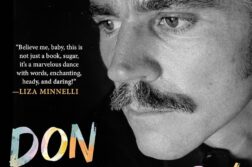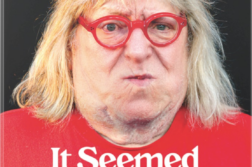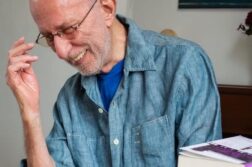LARRY KRAMER’S semi-autobiographical play The Normal Heart has finally made it to Broadway 25 years after it was first performed. The searing drama focuses on the terrifying early years of the AIDS epidemic in New York—when it was still referred to as the “gay plague”—and centers on Kramer’s autobiographical character Ned Weeks and his lover Felix Turner, a closeted journalist who gets caught up in the maelstrom of fear, politics, confused medical reports, homophobia, and the relentless loss of life. Kramer’s drama, written in the heat of a life-and-death battle, is freighted with the polemics of blame and responsibility. Today, it is a somber historical account of survival during the harrowing early plague years, complete with lessons learned and forgotten.
John Benjamin Hickey, an acclaimed character actor who plays Felix Turner in the current revival, discussed with me the continuing relevance of Kramer’s drama from his unique perspective as a member of the new ensemble cast. Describing himself as “a journeyman actor,” Hickey started his career by making a name for himself on the Broadway stage, where he originated the role of Arthur in Terrence McNally’s Tony Award-winning play Love! Valour! Compassion! in 1995, for which he won an Obie Award—a role he would recreate for the 1997 film version.
Among his many screen appearances is Hickey’s portrayal of Jack Dunphy, Truman Capote’s lover, in the 2006 biopic Infamous. One of his most important television roles was that of Philip Stoddard on the short-lived gay-themed ABC sitcom It’s All Relative. Currently he’s appearing in the Showtime Golden Globe-winning series The Big C as Sean Tolkey, a homeless
“freegan.”
Soon after The Normal Heart opened at the Golden Theater in late April, and just before he was nominated for the Tony Award for Best Supporting Actor, I discussed the challenges of his role, and of being an out actor in homophobic Hollywood.
Michael Ehrhardt: When The Normal Heart first opened downtown at Joe Papp’s Public Theater in 1985, some people criticized it for being too much of a diatribe—Larry Kramer yelling through the words of his actors—who didn’t speak at all like real people, but screamed out statistics. Do you believe it’s up to the actors to make it more than agitprop theatre?
John Benjamin Hickey: I believe The Normal Heart is much more than agitprop—although it is certainly that, in spades. It is also a beautiful, heartbreaking love story. And it’s funny. I have never thought of the play as a diatribe. From the moment I read the play, I found the characters so individual, so recognizably human, so alive, and all of them struggling, in their own voices, to make sense of the chaos of those early years of the plague. The play is deeply human, with stunningly good parts for actors. Larry has given all the characters such individual voices. It’s a dream play for an actor!
ME: Does the play pack the same impact today as in 1985? Does a younger audience, who weren’t of age during the first outbreak of AIDS, “get it”?
JBH: Well, that is up to the individual theatergoer to decide, whether it is as relevant today as when it was first written. To me, it feels like it could have been written yesterday. That is a testament to how great a dramatist Larry is. One of the great joys of doing the play now is seeing the younger audience members be so floored by it, so moved, and for them to get to see what that generation went through, what they lost, what they gained, thirty years ago. There are still so many prescient ideas in the play: gay marriage, health care, political oppression. Yes, it is also a period play. What’s shocking is how little has changed.
ME: Audience members have audibly gasped and sobbed during some of the play’s more intense scenes; how does that affect your performance?
JBH: Someone much smarter than me once said that theatre is a conspiracy between actors and the audience, because it is happening between them, together, live. So, to hear an audience go through such an emotional experience is amazing. There is no better feeling an actor can have, than to hear and feel an audience experience a great play.
ME: Did Larry Kramer offer any feedback or suggestions?
JBH: Putting aside politics and what he’s done for the gay community and gay rights and the AIDS movement, Larry’s work as a dramatist is so profoundly exciting—and humbling to me—and to have him with us to talk to about the production is the greatest gift you can get as an actor. It’s just amazing to be in the presence of such a great theatre artist; to hear him speak about the time, the characters, was invaluable. Larry is very approachable, very hands on. The play still lives in him, and that is exciting to be around. He has written a brilliant, impassioned letter about the play, and where we are now in relation to the plague, that he personally hands out at the end of the show.
ME: You’re pretty much a bi-coastal guy, through your work. Which coast do you prefer?
JBH: New York. My boyfriend lives in L.A., and I love to be with him, so I like L.A. because of that. But for work, there’s no greater feeling for an actor than being in a hit show on Broadway. Nothing even comes close.
ME: Is Hollywood as venal and corruptible as is often reported?
JBH: More venal, more corruptible. Except for when you are working there, and they are paying you well. Then it’s pretty okay.
ME: Actors are a fascinating breed; they are part narcissist (the spotlight, applause) and part masochist (constant auditions, rejection, and stage fright). What percentage are you of either?
JBH: I am pretty masochistic, especially when I’m looking at myself in the mirror, or on a playback monitor on set. So, maybe the narcissist feeds the masochist. Or maybe it’s the other way around. There is something in the terror of performing that is essentially masochistic, but the audience response, the applause, the love—well, I guess that feeds the narcissistic side.
ME: You earned your acting chops on both stage and screen, from the revival of Kander and Ebb’s Cabaret to Shakespeare and Schiller, as well as Law & Order and Flags of Our Fathers. How are theatre and film different, in terms of personal satisfaction?
JBH: It changes every day in TV and film, where the theatre is all ritual. You never shoot the same scene, the same episode, twice, so you’re constantly having to let go of your work, and move on to the next scene. In the theatre, when you have a wonky show on Thursday night, you get to come back on Friday and give it another go. You get eight chances a week. I think the discipline needed for each medium is very different. But arguably the “hoops of fire” aspect of getting the part requires the greatest amount of discipline, courage, and just plain balls. In television and film especially, when you’re a character actor like me, you very seldom are just “offered” parts. There are a lot of chefs in the kitchen, a lot of people whose opinions count. So, for instance, when I had to audition for the role of Sean on The Big C, I had to go in for a director’s session, then a producer’s session, then later that day a network session, and audition for a room full of suits every time. It’s ass-clenching! If the show runs ten years and I get paid a lot of money, I swear it will all be for the terror of that one day.
ME: At what age did you realize you wanted to be an actor?
JBH: I was a senior at Fordham University, getting an English degree, thinking I would get my masters, try to teach at college level; and I auditioned for the Juilliard School on a fluke, and got in. That’s when I knew I was going to try and do it. I was probably 22.
ME: Is the Broadway community closer bound than in Hollywood?
JBH: Much, much closer bound. It just seems so small and like such a tight community. You see each other at the same restaurants after the show, you pick up lunch at the same places between shows. As much of an overcrowded circus as Times Square is, and as much as I love New York—don’t get me started on Times Square. Actors in the Broadway community always seem to find each other, and there is always a place at the table. In Hollywood it’s hard to get a reservation. Plus, you don’t have that on-the-street energy there, that you do here. But the weather is nice.
ME: Are there any past projects you regret?
JBH: The only roles I really ache to perform are ones that I’m too old to play now. Tom in The Glass Menagerie, for instance. I never played Hamlet, but I did play Horatio. I’m more of a Horatio. I’ve gotten to do things in the theatre and on film that I never really dreamed of getting to do, like being directed by Clint Eastwood in Flags of Our Fathers. So, so far I feel like I’ve gotten to do it all. Talk to me when this is all over, though. Actors are never content for long.
ME: Your portrayal of Sean, “a modern day hobo,” in The Big C, and other parts you’ve played, demonstrate your versatility. But do you feel there’s still a prejudice about giving “straight” roles to openly gay men?
JBH: To be completely honest, I have really never felt like I lost something, a part, because I’m gay or because I’m out. I actually think in some ways more doors were opened for me, because of the confidence I had to be who I was. Now, mind you, I’m not a box office star; I’m a journeyman actor. I can see how some people might have more difficulty with it, and I am cool with that. Everyone has their own journey. I just don’t feel like I have ever been typecast, or limited by, my sexuality. I have played great gay parts, great straight parts.
ME: Do you resent when so-called straight actors play gay and win critical praise for it, yet the reverse doesn’t apply? I know it would piss me off.
JBH: I guess I know what you mean, that it seems braver, more “risky,” when a straight person plays gay. But if an actor is good and right for the part, it should never come into question, either way. I wish it were less of a double standard, but it’s better than it used to be. I think Larry is proud of the fact that both Joe Mantello and I are out, playing the leads in his play. Honestly, I don’t think about that. I just look at the part.
ME: You participated in “Standing on Ceremony: The Gay-Marriage Plays” in L.A. Is the marriage debate something that you feel deeply about?
JBH: I feel very, very strongly we should have the right to marry. The Normal Heart touches on gay marriage too, in ways that were so ahead of its time. It is time. “Standing on Ceremony” was a beautiful evening. They should do them in New York, and everywhere.
Michael Ehrhardt is a freelance writer based in New York City.




